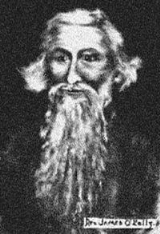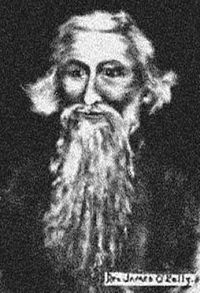
James O'Kelly
Encyclopedia

James O'Kelly was an American clergyman during the Second Great Awakening
Second Great Awakening
The Second Great Awakening was a Christian revival movement during the early 19th century in the United States. The movement began around 1800, had begun to gain momentum by 1820, and was in decline by 1870. The Second Great Awakening expressed Arminian theology, by which every person could be...
and an important figure in the early history of Methodism
Methodism
Methodism is a movement of Protestant Christianity represented by a number of denominations and organizations, claiming a total of approximately seventy million adherents worldwide. The movement traces its roots to John Wesley's evangelistic revival movement within Anglicanism. His younger brother...
in America. He was also known for his outspoken views on abolitionism
Abolitionism
Abolitionism is a movement to end slavery.In western Europe and the Americas abolitionism was a movement to end the slave trade and set slaves free. At the behest of Dominican priest Bartolomé de las Casas who was shocked at the treatment of natives in the New World, Spain enacted the first...
, penning the strong antislavery work Essay on Negro Slavery. Appointed as a Methodist circuit rider in 1777, he organized preaching circuits in central and southeastern North Carolina during the American Revolutionary War
American Revolutionary War
The American Revolutionary War , the American War of Independence, or simply the Revolutionary War, began as a war between the Kingdom of Great Britain and thirteen British colonies in North America, and ended in a global war between several European great powers.The war was the result of the...
. He continued his affiliation with the Methodist Episcopal Church
Methodist Episcopal Church
The Methodist Episcopal Church, sometimes referred to as the M.E. Church, was a development of the first expression of Methodism in the United States. It officially began at the Baltimore Christmas Conference in 1784, with Francis Asbury and Thomas Coke as the first bishops. Through a series of...
from its formal organization at the Christmas Conference
Christmas Conference (Methodism)
The Christmas Conference was an historic founding conference of the newly independent Methodists within the United States held just after the American Revolution at Lovely Lane Chapel in Baltimore, Maryland in 1784....
in 1784 when he was ordained an elder. Well regarded as a preacher, he successfully supervised pastors in several regions of Virginia and North Carolina.
O'Kelly, who favored the congregationalist
Congregationalist polity
Congregationalist polity, often known as congregationalism, is a system of church governance in which every local church congregation is independent, ecclesiastically sovereign, or "autonomous"...
system of church polity, came to oppose the church's system of centralized episcopal
Episcopal polity
Episcopal polity is a form of church governance that is hierarchical in structure with the chief authority over a local Christian church resting in a bishop...
authority, which he believed infringed on the freedom of preachers. At the 1792 General Conference of the Methodist Church he introduced a resolution that would allow clergy to appeal to the Conference if they believed their assignments from the bishop to be unsatisfactory. After several days of debate, the resolution was defeated. In protest, O'Kelly withdrew from the denomination and with his supporters founded the Republican Methodist Church, later known simply as the Christian Church, or "Connection"
Christian Connection
The Christian Connection or Christian Connexion was a Christian movement which began in several places during the late 18th and early 19th centuries and were secessions from three different religious denominations. The Christian Connection claimed to have no creed, instead professing to rely...
, which merged with the Congregational churches in 1931 to form the Congregational Christian Churches
Congregational Christian Churches
The Congregational Christian Churches were a Protestant Christian denomination that operated in the U.S. from 1931 through 1957. On the latter date, most of its churches joined the Evangelical and Reformed Church in a merger to become the United Church of Christ. Others created the National...
. The O'Kelly led schism is recognized as the first schism of the MEC. This body, in turn, merged with the German-American Evangelical and Reformed Church
Evangelical and Reformed Church
The Evangelical and Reformed Church was a Protestant Christian denomination in the United States. It was formed in 1934 by the merger of the Reformed Church in the United States with the Evangelical Synod of North America . After the 1934 merger, a minority within the RCUS seceded in order to...
in 1957 to form the present United Church of Christ
United Church of Christ
The United Church of Christ is a mainline Protestant Christian denomination primarily in the Reformed tradition but also historically influenced by Lutheranism. The Evangelical and Reformed Church and the Congregational Christian Churches united in 1957 to form the UCC...
. O'Kelly would later publish his position in a tract entitled The Author's Apology for Protesting against the Methodist Episcopal Government (1798). In this piece O'Kelly claims that then Methodist Bishops Francis Asbury
Francis Asbury
Bishop Francis Asbury was one of the first two bishops of the Methodist Episcopal Church, now The United Methodist Church in the United States...
and Thomas Coke
Thomas Coke
Thomas Coke *Thomas Coke of Melbourne Hall, Derbyshire, created Privy Counsellor]in 1708*Thomas Coke , early Methodist*Thomas Coke, 1st Earl of Leicester...
were not elected to the episcopacy by the Conference. O'Kelly is answered in 1800 by Nicholas Snethen. Snethen accuses O'Kelly of propagating "notorious falsehoods." O'Kelly, not one to let the argument rest, responds with his A Vindication of an Apology.
See also
- Methodist New ConnexionMethodist New ConnexionMethodist New Connexion was a Protestant nonconformist church, also known as the Kilhamite Methodists. It was formed in 1797 by secession from the Wesleyan Methodists, and merged in 1907 with the Bible Christian Church and the United Methodist Free Churches to form the United Methodist...
in Britain. - Moore, M. H. Pioneers of Methodism in North Carolina and Virginia, 1884.
- Kilgore, Charles Franklin. The James O'Kelly Schism in the Methodist Episcopal Church, 1963.
External links
- James O.Kelly texts at the Restoration Movement Pages at the Memorial University of NewfoundlandMemorial University of NewfoundlandMemorial University of Newfoundland, is a comprehensive university located primarily in St...

